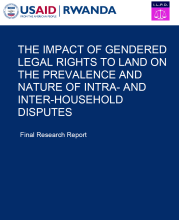Land Library
Bienvenido a la biblioteca de Land Portal. Explora nuestra amplia colección de recursos de acceso abierto (más de 74.000), que incluye informes, artículos de revistas científicas, trabajos de investigación, publicaciones revisadas por pares, documentos jurídicos, vídeos y mucho más.
/ library resources
Showing items 37 through 45 of 171.Between October 2014 and October 2015, Radio Ishingiro with the support of USAID
Land Project implemented a Communications Campaign focused on influencing the
attitudes and mindsets of men and boys about gender-equal land rights to overcome
This research, entitled "The Impact of Gendered Legal Rights to Land on the Prevalence and Nature of Intra- and Inter-Household Disputes" set out to interrogate the changing landscape of gendered land rights in Rwanda, and to examine the impact of the statutory changes introduced by laws governin
Rwanda has nearly 280,000 hectares of wetlands, almost 11% of the country’s total
area.1 These wetlands provide critical habitats for wildlife and biodiversity, maintain
important hydrologic processes that help to clean and protect ground and surface
This research investigates the changing landscape of gendered land rights in Rwanda, and examines the impact of the statutory changes introduced by laws governing land, inheritance, succession and matrimonial property passed between 1999 and 2013.
Land is a critical resource. It is finite and irreplaceable. The role and efficiency of land use planning is therefore of considerable national importance. The issues faced by Rwanda in relation to land and land use planning are well recorded.
Before 1999, land rights in Rwanda were governed by three regimes: customary
(traditional) law, colonial laws still in effect, and laws enacted after independence. In each of
these, men were privileged in ownership and control of land whereas women were excluded
Rwanda is developing at a remarkably rapid pace, and with that development has come a multitude of corresponding changes to the orientation and use of land throughout the country.
Over the last decade, the Government of Rwanda (GoR) has engaged in reforming the land sector through formulation and enactment of an enabling legal framework, establishment of land administration institutions, and land tenure regularization.
Rwanda is developing at a remarkably rapid pace, and with that development has come a
multitude of corresponding changes to the orientation and use of land throughout the country.
In light of these changes, law n°18/2007 of 19/04/2007 relating to expropriation in the public









